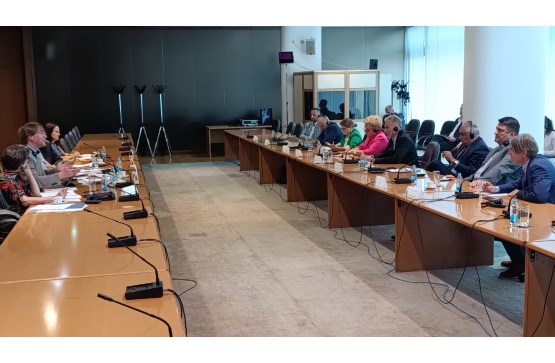6/10/2024
Representatives of the ruling parties in the Parliamentary Assembly of Bosnia and Herzegovina (PA BiH) met with the delegation of the Venice Commission

As part of their multi-day visit to our country to prepare an Opinion on the draft law on the High Judicial and Prosecutorial Council of Bosnia and Herzegovina (HJPC BiH), the delegation of the European Commission for Democracy through Law (Venice Commission) of the Council of Europe met with representatives of the political parties that are the parliamentary majority in the Parliamentary Assembly of BiH (PA BiH).
Representatives of the PA BiH, including the Speaker of the House of Peoples Kemal Ademović, delegate Marina Pendeš, and MPs Mia Karamehić-Abazović, Miroslav Vujičić, Milorad Kojić, Predrag Kožul, Predrag Kojović, and Milan Petković, emphasized during the discussions that the state of the judiciary in Bosnia and Herzegovina is constantly poor. They assessed that its characteristics are sluggishness, inefficiency and that it is strongly influenced by politics and confused by inadequate solutions within the implemented judiciary reforms. In such circumstances, the HJPC has not raised the level of judicial independence, nor has it effectively fulfilled its role and created an environment in which the overall situation could be improved, and the accountability of judges and prosecutors raised to the highest possible level.
In the discussion with the Venice Commission Delegation, the attending MPs, and delegates, in individual statements, pointed out numerous shortcomings in the judiciary for which the High Judicial and Prosecutorial Council of Bosnia and Herzegovina has not provided an adequate response through its work and for which this body bears a significant responsibility. It was mentioned, among other things, that the HJPC has not influenced the reduction of the number of cases that have not been processed or the practice of favouring work on less complex cases to meet judicial norms more easily. Furthermore, they highlighted the unchanged practice of lengthy trials in processes that objectively require much faster resolutions.
On several occasions, the HJPC was described as an alienated centre of power with very strong interest groups that do not allow significant progress. One of the tasks that, as stated today, has not been realized is the establishment of property records of judicial officials, so for less than one-fifth of judges and prosecutors in BiH, the extent and origin of their property are known. Moreover, different administrative units in BiH adhere to standards that are completely inconsistent.
Some MPs and delegates of the PA BiH also pointed out the unsatisfactory entity and ethnic representation among the members of the Council as well as among the officials of the Secretariat of the HJPC, whilst there were also different opinions stating that insisting on any ethnic principle in the judiciary is unacceptable.
After listening to the presentations of the representatives of the PA BiH, members of the Venice Commission Delegation were particularly interested in the steps taken to increase the efficiency of the judiciary and shortening of the duration of trials, acceptable models for expanding the number of HJPC members, and considerations on whether the reform of the judiciary should start with the HJPC.
Through a series of meetings with officials from BiH, the Venice Commission Delegation, as stated today, seeks to prepare a high-quality Opinion on the draft law on the High Judicial and Prosecutorial Council of Bosnia and Herzegovina (HJPC BiH). This document is expected to be drafted next week and presented at the plenary session of this expert body of the Council of Europe on 21 and 22 June. The ultimate purpose of this material, it was emphasized, is to contribute to the higher quality of the Law on the HJPC and the improvement of the functioning of the judiciary in line with European standards. (End)
|
PRESS
CONTACT |
Public relations department |

